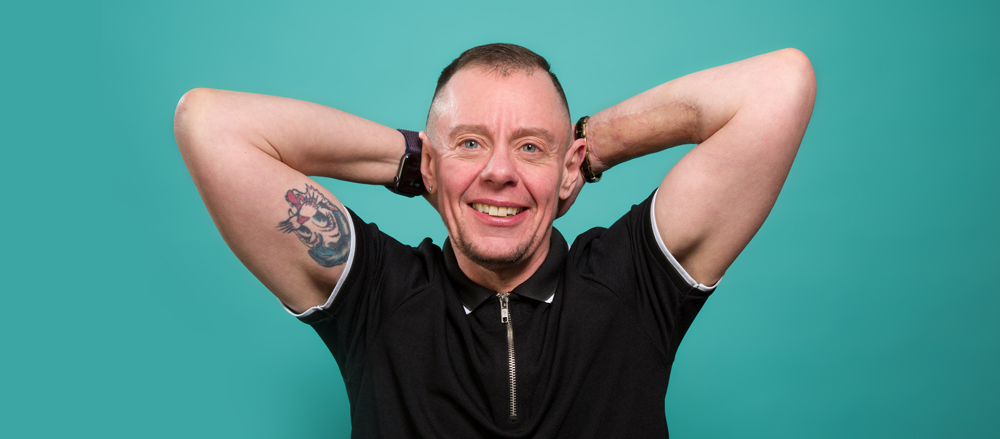
A vital part of good sexual health means having the confidence and skills to ask for the sex that makes you feel good. Knowing our own comfort level with sex and understanding its risks and benefits, lets us create a safe relationship with sex.
We’re all different and there’s no one way to be trans or non-binary. Some of us feel able to enjoy our bodies sexually, regardless of how and if we make a physical transition. For others it can be more challenging. Wherever you are on this spectrum, you have a right to enjoy yourself and feel comfortable with the sex you are having.
If you’ve transitioned a while ago, you might feel confident that you know how to have a fulfilling sex life but may need some information on sexual health and wellbeing.
Transition and feeling good about yourself
Our thoughts and feelings play a pivotal role in how we view our bodies and can have a knock-on effect on our sexual wellbeing. It’s important to be kind to yourself and take care of your body, even if you feel at odds with it. You may not always feel this way. Your physical wellbeing can influence your mood and mental health. Taking care of your body will boost your overall wellbeing.
It can be difficult navigating sex, especially if your partner finds parts of your body to be attractive that you don’t feel connected to or that you find distressing. You have the right to enjoy sex and you shouldn't feel like you have to use parts of your body if you don’t want to.
People find different ways of managing these potentially conflicting feelings. Learning new skills and ways to communicate can help you negotiate safer sex and increase your confidence.
You can continue to use clothing like binders and packers during sex if that feels good for you. There are a variety of toys on the market that can help with sex. Try different things out. What works for others may not work for you.
Quote textSince I began my transition I have not been in a place where I am comfortable enough with my body to think about being sexually intimate with another person. Over time, especially after having my top surgery, this has started to shift, and as my sense of self is getting stronger.
Sex drive, sexuality and hormones
Even at the start of testosterone, the changes in sex drive can be dramatic. Many people report a heightened sex drive when they start taking testosterone. However, this well-documented effect isn’t always the case. Beginning hormones can be a time of uncertainty and stress and not everyone will be in the emotional and mental state to experience this and may even feel a loss of libido. It may take a bit of time to get used to some of the changes happening to you and your body.
One of the first changes to happen with testosterone is growth of the clitoris. This can start to happen within the first few weeks of hormone use, which can focus attention on that part of the body.
Some people find that this time of increased libido can lead to a period of exploration of sexuality and experimentation. For some this includes a new interest in sex with people of a different gender, as our bodies and the way we relate to them changes too.
You might feel more adventurous and take risks that you wouldn’t have done before. It’s important to look after your sexual health as you explore your own sexuality.
Quote textI used to have to go home from work early or during my lunch hour to relieve myself, I would get so horny.
Testosterone alone can be enough to alleviate feelings of dysphoria. However, some people need to undergo gender-affirming surgeries before they can comfortably engage with their body. This can include top surgery and/or genital surgery such as metoidioplasty or phalloplasty, as well as the removal of reproductive organs. Metoidioplasty and phalloplasty are both types of female-to-male gender-affirming surgery.
Metoidioplasty involves the surgical creation of a penis from your existing genital tissue. It's a less-extensive procedure than phalloplasty and is performed after the clitoris has been enlarged through the use of testosterone therapy. It's possible to undergo phalloplasty after a metoidioplasty but not the reverse. Phalloplasty involves the surgical creation of a penis and urethra from skin (usually your forearm) and other tissue harvested from another part of your body.
Many trans and non-binary people find pleasure in their bodies without undergoing genital surgery. We're often led to believe that the narrative of being in the ‘wrong body’ is true of all trans people but this is simply not the case. Being able to enjoy your body as it is doesn’t make you any less trans. Many trans masculine people derive a lot of pleasure from their front hole/vagina, dick/clitoris, and also like to use sex toys.
Surgery and sex
There are several options to the kind of genital surgery you might have had or plan to have. Deciding on what safer sex practices will work for you depends on what surgery you’ve had.
If you've had full phalloplasty and are being a top, or insertive partner, then you can use a condom. A variety of sizes are available. If you're being a bottom, or receptive partner, then your partner can use a condom.
Quote textI’m more comfortable being sexual and being naked now. After stage one and two the phallo didn't look great yet, so it wasn’t really until everything was done that I felt ready to be sexual again
Metoidioplasty is also an option, making the most of clitoral growth brought about by testosterone therapy. Due to the smaller size, some people find they can use an external condom with their genitals post metoidioplasty and others find they can’t. It’s worth trying a selection of sizes to see what works for you. Internal condoms for your partner will offer the best protection if you are the top or insertive partner.
After any kind of surgery, be patient and manage your expectations. It takes years from start to finish, with extra time added for corrections and extra optional stages. It will look a bit different at every stage, which can take some getting used to.
Getting to know your body will be beneficial for you and who you have sex with. A meta penis can be used for penetration as well as oral sex and the many other ways to enjoy genital stimulation.
Quote textBy figuring out what felt good when masturbating I felt more confident showing partners what I wanted, didn't want etc. I recommend this is something everyone does!
Masturbation is a good way to get to know your new body parts. It's best to check with your surgeon as to how soon you can do this. There will be many surgical sites inside and on the body where surgery has taken place, so take care while they're healing. There are a variety of toys available to help with your exploration. Some trans people report that they have to learn new ways to orgasm. Masturbation is beneficial too, as stimulating the nerve endings help them embed and increase sensation.
You may feel shy about sex, especially if you've been avoiding it for many years. This is a natural and understandable feeling. Take your time to find the right partner for you, who will help you feel good.
Quote textI do a mental gymnastics with my body. My cock might not look like that of a cis man, but it is still my cock.
Sex, dating and apps
Sex and dating can be both challenging and empowering. Exploring yourself and others can help you figure out what’s right for you, and help you take control of your sexual health and wellbeing.
There are different ways to navigate how and when you disclose to a partner about your trans or non-binary status. Many dating apps, especially those designed for LGBTQ+ people, give easy options to identify as being trans or non-binary, and many now have features that let you state your pronouns and gender identity. You can often also use free text to describe your own gender.
Think about when feels the safest and most appropriate time to disclose your trans or non-binary status to a potential partner: on your profile, before you meet, on your first date.
Some people like to be open about who they are on apps, providing information about their gender identity, what they like sexually and what body they have. It’s up to you to decide for yourself what feels safe and right for you. Apps can be a useful way to discuss your likes and dislikes with a prospective sexual partner as well as to negotiate safer sex with one another.
If you decide to meet someone in person, it's a good idea to tell a trusted friend. You might want to share where you're going, when they can expect you to come back and who you're planning to meet.
Quote textI put my being trans all over my profile. It saves any awkward moments later on when I would need to come out. I don’t want to invest time and energy in someone who would reject me on grounds of my trans experience.
Relationships
Every relationship is different. Be open and honest with your partner about how you feel and what you want and need from each other. When one partner comes out as trans or non-binary, or embarks on a transition, it can change the dynamic of a relationship. Some couples find their relationships get stronger and others find that they drift apart. As our bodies and social roles change, the way we are perceived changes and partners we might have previously sought out may not share the same interests as before.
Transition can be a period of intense introspection and self-absorption. It’s important to take the time and space you need to explore your feelings around gender and what you need to do next. Be mindful of others, as transition can be an especially difficult time for partners. It can be hard to find the right balance.
There are lots of ways to have relationships, including open relationships, polyamory, non-monogamy, and more. All are valid and rely on open communication and consent to work well.
Consent and navigating sex
You should feel safe, empowered and have the kind of sex you want. Learning to negotiate the sex that you want, and experience pleasure with potentially new body parts can take time. You might need time to build up confidence and learn new skills to help you negotiate safer sex. You should never be pushed into anything that you are uncomfortable with.
Aiming to practise good consent (keeping sexual activity consensual and respectful of your limits and preferences) means that your sex will be safer and more likely to meet your expectations. Communicating with your partner before and during sex can sometimes be awkward, but it’s the best way to ensure you are both happy and comfortable with what’s happening.
Checking in before sex is also a great time to decide on what barriers and protections you are going to use.
If your partner doesn't respect your wishes or practise good consent, this may be abusive. Even if you don't feel that ‘abusive’ is the correct term, if the way they interact with you sexually makes you upset or uncomfortable, you can access support and advice from LGBT charity Galop.




